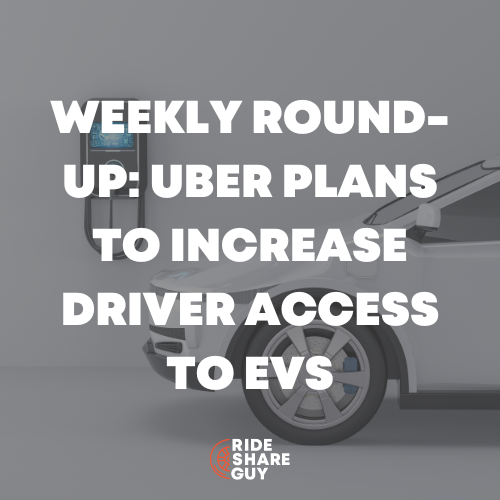Big news this week with Uber drivers being granted class action status in the California employment lawsuit. And while it won’t have an immediate bearing on the case, it does raise the stakes significantly for Uber.
On Wednesday, I joined Shannon Liss-Riordan (the plaintiffs’ lawyer in this case), Arun Sundarajan (NYU Stern Professor/Sharing Economy Expert) and Nancy Redd (host) on HuffPost Live to discuss the ruling and what it means for drivers. You can watch the 30 minute roundtable session here.

We’ll be sure to keep you guys updated on this case and we’ll be interviewing/bringing on experts in the future to help explain what this could mean for drivers.
Today, RSG contributor, John Ince, takes a look at some stories around the class action status, Uber’s dealings in China and more.
Uber drivers granted class action status in lawsuit over employment
Sum and Substance: Uber drivers are entitled to class action status in litigation over whether they are independent contractors or employees, a key development in a case threatening Uber’s business model and that of other hot startups dependent on similar service workers. Three drivers sued Uber in a federal court in San Francisco, contending they are employees and entitled to reimbursement for expenses, including gas and vehicle maintenance. The drivers currently pay those costs themselves. The results of Uber’s legal battle could reshape the sharing economy, which is built around Internet companies that serve as marketplaces matching people who provide a service with others looking to pay for it.
… In the ruling on Tuesday, U.S. District Judge Edward Chen in San Francisco said California drivers could sue as a group on the question of whether they are employees or contractors, and over their demand for payment of tips that were not passed on to them. Drivers’ attorneys must submit more evidence to sue as a group for reimbursement of other expenses.
… Chen also said Uber drivers who have worked for the service since May 2014 must specifically opt out of an arbitration agreement in order to sue the company.
My Take: This is a major legal victory for Shannon Liss-Riordan, and for rideshare drivers everywhere. But it’s not a completely favorable ruling for drivers. By limiting the class action to those who opted out of an arbitration agreement, it forces any driver who wants to be included in the class action to proactively contact Shannon Liss-Riordan’s office.
That’s cumbersome, with a potential field of 160,000 drivers. In any event, it’s a clear sign that Uber’s business model is vulnerable to attack. If I were an investor in Uber I would be concerned – very concerned – because the legal warriors are now arrayed against the company and they’re winning key battles in the War against the big bad TNC’s.
Seattle might try something crazy to let Uber drivers unionize
Sum and Substance: Seattle may try a novel legal approach to helping Uber drivers to unionize — and potentially other independent contractors too, if the idea holds up in court. Today, a Seattle City Councilmember is expected to announce legislation that would grant all for-hire drivers in the city the right to collectively bargain with the companies they contract with to provide services, which they currently can’t do under federal law, setting up an entirely new system.
Here’s how the new system , which will be formally introduced in the Council next week, would work: Drivers would vote on a non-profit organization to serve as their “exclusive driver representative,” which would then negotiate a contract with the company. If the two parties fail to come to an agreement, they have to submit to arbitration. The resulting contract would be enforced through the courts, rather than the National Labor Relations Board, which unions have found to be slow and sometimes ineffective in deterring employers from violating contract terms.
My Take: This is integrally related to the first story as the legal right to unionize is a critical issue in relations between the TNCs and drivers. Seattle’s approach is intriguing. If it passes legal muster it really complicates things for the TNCs because Seattle would be giving other cities a template to use in their own situations.
Leaked Documents Show Uber’s Cost Structure, Best-Performing Cities
Sum and Substance: FOXBusiness.com has obtained leaked documents that Uber is using to persuade investors to participate in its Uber China financing. The global ride-sharing company is close to finalizing a round of at least $1 billion that would value Uber China at more than $7 billion, according to a source with direct knowledge of the matter. FOXBusiness.com has also learned that the company is telling potential investors that Uber China will be spun off as a separate business that could IPO before Uber. The documents show that Uber’s “net present value,” a projection of cash flows, is $4.9 billion in Shanghai, $2.2 billion in Guangzhou and $1.8 billion in Shenzhen.
While Uber is the dominant car service app in the United States, it has a lesser market share in China, due to competition from services like Didi Kuadi. Uber is also showcasing its “contribution margin” in various cities, a measurement of each region’s profitability. The company’s “contribution margin” is at 11.1% in Stockholm and Johannesburg and 10.1% in San Francisco. Other top cities include London, Charleston, Melbourne, Washington DC and New York. The breakdown shows that Uber pays roughly 80% of what it generates from gross bookings in driver commissions.
My Take: The number that pops out to me here is $4.9 billion of projected cash flow at net present value for Shanghai alone. This is an astounding number, not only because it’s so large, but perhaps more significantly because Uber can’t possible come up with a number like this with any degree of accuracy – in a situation fraught with competition, legal thickets and any number of other uncertainties.
I’ve been increasingly skeptical about the numbers Uber releases to potential investors. This does nothing but increase my skepticism, especially in the face of the $400 billion of operating losses that Bloomberg uncovered in it’s leaked Uber financials. … especially if you read this next story by Pando Daily’s Sarah Lacey.
The truth about Uber in China by Sarah Lacy of Pando Daily
Sum and Substance: “I’ve spent a good part of my summer digging into Uber’s business in China. There’s no more important story for Uber right now: China will absolutely be the largest ride sharing market in the world, with high smartphone penetration, low car ownership, six mega-cities with greater than ten million people and 160 cities with a population of more than 1 million people. While in China this past June raising capital, Uber CEO Travis Kalanick said Uber was doing 1 million rides a day there, and that China could easily eclipse the US as Uber’s largest market by the end of the year. The fact that Uber is doing so “well” in China despite having only 11% of the market shows why the combative CEO has no choice but to win there… or at least carve out a respectable market share. Everything he’s achieved in the US is peanuts compared to China’s potential. And Kalanick has never considered himself a man who deals in peanuts.
But that single vanity number of daily rides has come at an unsustainably high cost. Uber has told investors it will spend more than $1 billion this year in China, mostly in runaway subsidies trying to buy market share. Some Chinese press and analysts have reported that that $1 billion won’t even last the year if Uber maintains current subsidies it’s been paying. And that’s before you consider that Uber plans to expand from 16 to 100 cities in China by next year. Uber has raised a lot of money by Silicon Valley standards– $7 billion to date. But even Uber can’t continue to subsidize this level of losses. Enter the subsidiary Uber China, which needs money fast if this house of cards is going to stay up.”
My Take: There are some really important revelations in this story about how Uber seems to be doubling down its bets in China when even when they’re not dealing from strength. According to Lacy’s interviews, the subsidies they’re offering to passengers are “wildly unsustainable,” and the quality and service of the rides have “fallen off a cliff” as Uber lowers their standards for recruiting drivers.
Among the more interesting sub plots is how Uber apparently sought to make the China financing appear to be “oversubscribed” why ponying up almost a third of the offering themselves. Sarah Lacy, uses the term “House of Cards” to describe what’s happening for Uber in China. She knows more on this than I do … and I suspect knows more than most investors.
Lacy also points out a really telling strategy move on Uber’s part … “Uber has separated its Chinese business into a subsidiary called “Uber China”– not totally uncommon for US companies looking to do business in China, but arguably also a handy way to contain this escalating mess from destroying Uber global’s balance sheet and cap table.”
Uber Hires the Hackers Who Wirelessly Hijacked a Jeep
Sum and Substance: If it’s possible to wirelessly attack an Internet-connected Jeep to hijack its steering and brakes, what could hackers do to a fully self-driving car? A pair of the world’s top automotive security researchers may be about to find out, with none other than Uber footing the bill. Starting Monday, the ridesharing startup’s Advanced Technology Center will employ Charlie Miller and Chris Valasek, two hackers who have devoted the last three years to developing digital attacks on cars on trucks. Their work culminated last month in a full, over-the-internet takeover of a 2014 Jeep Cherokee, (with me behind the wheel) including the ability to turn off its transmission or engine, and even disable its brakes at low speeds. Their demonstration led Chrysler to recall 1.4 million affected vehicles, the first known automotive recall for a cybersecurity vulnerability.
My Take: I guess I’d rather have these guys working for Uber than against it, but why does this make me so queasy?
What do you guys think about the week’s top stories?
-John @ RSG




